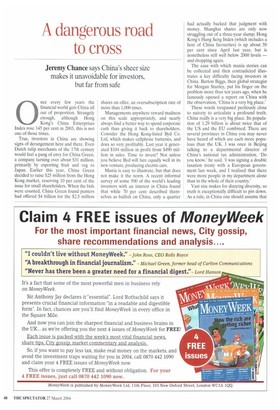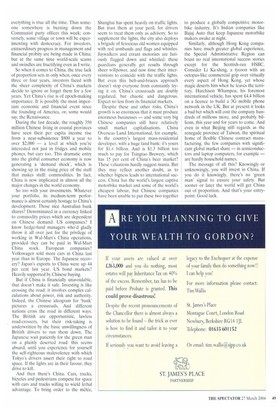A dangerous road to cross
Jeremy Chance says China's sheer size makes it unavoidable for investors, but far from safe 0 nce every few years the financial world gets China all out of proportion. Strangely enough, although Hong Kong's China Enterprises Index rose 145 per cent in 2003, this is not one of those times.
True, investors in China are showing signs of derangement here and there. Even Dutch tulip merchants of the 17th century would feel a pang of envy for China Green, a company turning over about $31 million, primarily by exporting fruit and veg to Japan. Earlier this year, China Green decided to raise $25 million from the Hong Kong market, reserving 10 per cent of the issue for small shareholders. When the bids were counted, China Green found punters had offered $4 billion for the $2.5 million shares on offer, an oversubscription rate of more than 1,000 times.
Managements anywhere reward madness on this scale appropriately, and nearly always find a better way to spend corporate cash than giving it back to shareholders. Consider the Hong Kong-listed Byd Co. Ltd, which makes cellphone batteries, and does so very profitably. Last year it generated $104 million in profit from $490 million in sales. Time to invest? Not unless you believe Byd will fare equally well in its new venture, producing electric cars.
Mania is easy to illustrate, but that does not make it the norm. A recent informal survey of some 500 of the world's leading investors with an interest in China found that while 70 per cent described themselves as bullish on China, only a quarter had actually backed that judgment with money. Shanghai shares are only now struggling out of a three-year slump; Hong Kong's Hang Seng Index (which includes a host of China favourites) is up about 50 per cent since April last year, but is nonetheless still well below 2000 levels — and dropping again.
The ease with which mania stories can be collected and then contradicted illustrates a key difficulty facing investors in China. Barton Biggs, then global strategist for Morgan Stanley, put his finger on the problem more than ten years ago, when he famously opened a report on China with the observation, 'China is a very big place.'
These words trespassed perilously close to naivety to articulate a profound truth. China really is a very big place. Its population of 1.29 billion is about twice that of the US and the EU combined. There are several provinces in China you may never have heard of which are each more populous than the UK. I was once in Beijing talking to a departmental director of China's national tax administration. 'Do you know,' he said, 'I was signing a double taxation treaty with a European government last week, and I realised that there were more people in my department alone than in the whole of their country.'
Vast size makes for dizzying diversity, so truth is exceptionally difficult to pin down. As a rule, in China one should assume that everything is true all the time. Thus someone somewhere is burning down the Communist party offices this week; conversely, some village or town will be experimenting with democracy. For investors, extraordinary progress in management and financial probity are being made in China; but at the same time world-scale scams and swindles are fructifying even as I write.
So when it comes to China, the true lack of proportion sets in only when, once every three or four years, investors faced with the sheer complexity of China's markets decide to ignore or forget them for a few years. Yet China's rise is of epoch-making importance. It is possibly the most important economic and financial event since the founding of America, or, some would say, the Renaissance.
During the last decade, the roughly 350 million Chinese living in coastal provinces have seen their per capita income rise from a near-subsistence $800 a year to over $2,000 — a level at which you're interested not just in fridges and mobile phones, but cars too. This dramatic entry into the global consumer economy is now generating a 'demand shock', which is showing up in the rising price of the stuff that makes stuff: commodities. In fact. China is now implicated in almost all the major changes in the world economy.
So too with your investments. Whatever your portfolio, its medium-term performance is almost certainly hostage to China's development. Those nice Australian bank shares? Denominated in a currency linked to commodity prices which are dependent on Chinese demand. US companies? I know hedge-fund managers who'd gladly throw it all over just for the privilege of working in Wal-Mart's China operations, provided they can be paid in Wal-Mart China stock. European companies? Volkswagen sold more cars in China last year than in Europe. The Japanese recovery? Japan's exports to China were up 44 per cent last year. US bond markets? Heavily supported by Chinese buying.
But if China is financially unavoidable, that doesn't make it safe. Investing is like crossing the road: it involves complex calculations about power, risk and authority. Indeed, the Chinese ideogram for 'bank' pictures a crossroads. And different nations cross the road in different ways. The British are opportunistic, lawless road-crossers, but their risk-taking is underwritten by the basic unwillingness of British drivers to run them down. The Japanese wait patiently for the green man on a plainly deserted road: this seems absurd, until you experience for yourself the self-righteous malevolence with which Tokyo's drivers assert their right to road space. If the lights are in their favour, they drive to kill.
And then there's China. Cars, trucks, bicycles and pedestrians compete for space with cars and trucks willing to wield lethal advantage. To bring order to the melee, Shanghai has spent heavily on traffic lights. But trust them at your peril, for drivers seem to treat them only as advisory. So to supplement the lights, the city also deploys a brigade of ferocious old women equipped with red armbands and flags and whistles. Jaywalkers and errant motorists are furiously flagged down and whistled: these guardians generally get results through sheer willpower, and now time their interventions to coincide with the traffic lights. But even this belt-and-braces approach doesn't stop everyone from constantly trying it on. China's crossroads are doubly regulated, but chaotic and dangerous. Expect no less from its financial markets.
Despite these and other risks, China's growth is so enormous that it must produce enormous businesses — and some very big Chinese companies still have relatively small market capitalisations. China Overseas Land International, for example, is the country's largest mass-residential developer, with a huge land bank: it's yours for $1.4 billion. And is $1.3 billion too much to pay for Tsingtao Brewery, which has 15 per cent of China's beer market? These valuations hardly suggest mania. But they may reflect another doubt, as to whether bigness leads to international success. China has the world's largest captive motorbike market and some of the world's cheapest labour, but Chinese companies have been unable to put these two together to produce a globally competitive motorbike industry. It's Indian companies like Bajaj Auto that keep Japanese motorbike makers awake at night.
Similarly, although Hong Kong companies have much greater global experience, the Special Administrative Region can boast no real international success stories except for the Scottish-run HSBC. Consider Li Ka-shing, a tycoon with an octopus-like commercial grip over virtually every aspect of Hong Kong, yet whose magic deserts him when he leaves the territory. Hutchison Whampoa, his foremost international vehicle, has spent £4.4 billion on a licence to build a 3G mobile phone network in the UK. But at present it looks a bad bet which will cost the company hundreds of millions more, and probably billions, this year and for years to come. And even in what Beijing still regards as the renegade province of Taiwan, the spiritual home of flexible Chinese contract manufacturing, the few companies with significant global market share — in semiconductors and laptop computers, for example — are hardly household names.
The message of all this? Knowingly or unknowingly, you will invest in China. If you do it knowingly, there's no 'green man' signal to ensure your safety. But sooner or later the world will get China out of proportion. And that's your entrypoint. Good luck.



























































































 Previous page
Previous page